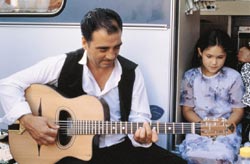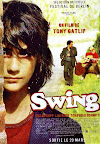01 May, 2009
Music of the Roma and the Manouche. Two films by Tony Gatlif.
Posted by: Christina Fellenberg In: Movies
 |
| Von Films of Tony Gatlif: Tchavalo Schmitt in “Swing” |
Tony Gatlif (*1948 Algiers) is a French director, actor, screenwriter and composer. His father was a Kabyle, a Berber from Algeria, and his mother a Roma. Both cultural backgrounds had a strong impact on his work and inspired him to make many of his films. After the war in the 1960s he left Algeria and emigrated to France.
What is remarkable about Gatlifs films is the broad space he concedes to the development of music; be it an improvisation of a mixed ensemble in a Manouche-caravan, or a possession ritual accompanied by music in North Africa (Exils 2005). And this is only one reason why his works are interesting in terms of ethnomusicology. Through the particular characters we get to know the social conditions of the musicians in question, the history of an ethnic group as well as the function of music in concrete cultural contexts.
Gadjo Dilo 1997
France. 97 min.
 |
| Von Films of Tony Gatlif |
At heart, it is the story of a quest. Stephane, a young Frenchman is travelling throughout Romania in order to find a Roma singer which he knows from a cassette recording he inherited from his father.
This film constitutes the last one within a trilogy about the Roma. The first two films were Les Princes and Latcho Drom. In the Romani language Gadjo refers to a stranger. It is thus a distinguishing notion for non-Roma people. In this film gadjo dilo means “crazy man” or “crazy stranger”.
Many situations, in which music plays a crucial role are depicted. Thus, we hear marriage songs and dance music as well as ballads or songs narrating the difficulties of the Roma such as the partially violent conflict between Romanians and Roma. Here you can find a subtitled example of a ballad, interpreted a cappella by a female singer.
http://www.youtube.com/watch?v=83q2slH1sjI
Swing 2001
France. 87 min.
Music: Mandino Reinhardt, Tchavalo Schmitt, Abdellatif Chaarani and others.
 |
We accompany Max, a little French boy, during one summer. In a suburb of Strasbourg, he gets in touch with the intoxicating and stirring Manouche music and his first love. Swing and Max are inseparable. Enthusiastic about the Manouche music he decides to take guitar lessons with Miraldo, who is played by one of the greatest Manouche jazz musicians Tchavolo Schmitt. The traditional “Les yeux noirs” (The black eyes): http://www.youtube.com/watch?v=6D_lHNbZvVk
Manouche, which literally means human is the self-designation of the Sinti group living in France and adjacent countries. Their presence in Western Europe is documented since the 15th century . One of the most famous Manouche musicians was Django Reinhardt.
Tony Gatlif about the Manouche Swing: “It is a music of the air, of space. The hand of Tchavalo which is running over the neck of his guitar, one may say that a bird is flying away! This music which could be full of pain and fury turns out to be full of communicative gaiety. There is nostalgia, but without any gravity. It is a music that is not cute but beautiful. Blitheful and free like the little Swing. It is arrogant and dares going from one another while breaching the rhythm. […] Tchavalo is the heir to Django Reinhardt. The heir to the Manouche music. He has this liberty, this arrogance of the « not having » “
As Tony Gatlif embeds music in a social reality, we get an idea of the neighbourhood, of gender relationships and of the bother with bureaucratic forms. In the traditional songs which are orally transmitted, their experiences, hopes and outlook on reality are reflected.
The Puri Dai (Romani for the elder woman) sings:
Come, we’ll travel
We have spoken about it for so long
Then, we are all together
Then, we make music
We dance and drink.
Near the forest, we have set our wagon
Such beauty it is to be in the nature
When you see things wistfully
So, may your heart open up again.
Sometimes, the intercultural encounter, namely with Arab and Jewish music and with an Alsatian choir, turns out to be complicated, somehow funny and finally fruitful in many regards. For Tony Gatlif dialogue by means of music seems to be the underlying idea.
Extract from “Le chant de la paix“ (The song of peace)
Because he
whose heart has never burnt of love
who has never been a slave of love
will never know
the secrets of the hereafter,
will never know
the uniqueness of being one
(Translations from French: Christina Fellenberg)

